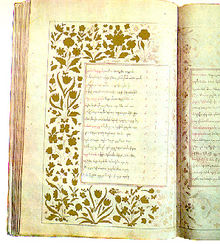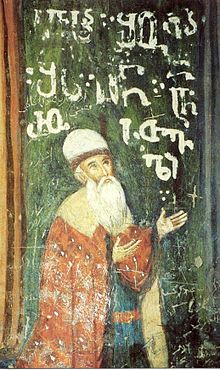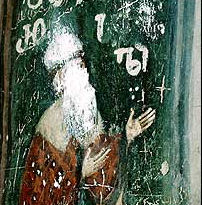Shota Rustaveli

Shota Rustaveli (Georgian: შოთა რუსთაველი, 1160 - ?) was a Georgian poet of the 12th century, and the greatest classic of Georgian secular literature. He is author of "The Knight in the Panther's Skin" (the actual name is Vepkhistkaosani, which means The wearer of Tiger's Skin, Knight in Tigers Skin on Georgian is translated as Raindi Panteris Tkavshi or Panteris Tkaosani as The wearer of Panther's skin), the Georgian national epic poem.
Biography
Little, if anything, is known about Rustaveli from the contemporaneous sources. His poem itself, namely the prologue, provides a clue to his identity; the poet identifies himself as "a certain Rustveli." "Rustveli" is not a surname, but a territorial epithet which can be interpreted as "of/from/holder of Rustavi." The later Georgian authors of the 15th-18th centuries are more informative: they are almost unanimous in identifying him as Shota Rustaveli, a name which is preserved on a fresco and a document from the formerly Georgian Monastery of the Holy Cross at Jerusalem. The fresco was described by the Georgian pilgrim Timote Gabashvili in 1757/58, and rediscovered by a team of Georgian scholars in 1960. The same Jerusalem document speaks of Shota as a sponsor of the monastery and a "high treasurer," thus echoing a popular legend that Rustaveli was a minister at Queen Tamar’s court and retired to the monastery in an advanced age. Both a folk tradition and the 17th-century royal poet Archil identify Rustaveli as a native to the southern Georgian region of Meskheti, where his home village Rustavi was located (not to be confused with the modern-day city of Rustavi near Tbilisi). He is assumed to have been born between 1160 and 1165. A legend has it that Rustaveli was educated at the medieval Georgian academies of Gelati and Ikalto, and then in "Greece" (i.e., the Byzantine Empire). He must have produced his major work no earlier than the 1180s and no later than the first decade of the 13th century, most probably c. 1205-1207.

His work
"The Knight in the Panther's Skin" (ვეფხისტყაოსანი) has been translated into many languages. It was first printed in 1712, in Tbilisi (capital of Georgia).
Among the illustrated secular works produced in Georgia, the manuscripts of "The Knight in the Panther's Skin" occupy an important place.

In the Institute of Manuscripts of Georgia (Tbilisi) are two folios of the text of the XVI century, and some lines of the poem belong to the XIV century. All other copies of the poem belong to the XVII century (manuscript of c. 1653, H-54 of the Institute of Manuscripts).

The highest Prize of the Republic of Georgia in the fields of Art and Literature is the Shota Rustaveli State Prize. The main street in Tbilisi is the Rustaveli Avenue. Also existing in Tbilisi are the Rustaveli Theatre, the Shota Rustaveli Institute of Georgian Literature of the Georgian Academy of Sciences, the Shota Rustaveli Underground Station, etc.
Vandalism of Rustaveli fresco in Israel

The fresco representing the legendary Georgian poet Shota Rustaveli was vandalized on June, 2004 in the 11th-century Georgian-built Monastery of the Holy Cross. An unknown criminal scratched out the face of Shota Rustaveli and part of the accompanying Georgian inscription with his name on the south-west pier. Georgia officially complained to Israel after the priceless fresco was defaced in Jerusalem. [1]
Other
On September 3, 2001, Israel and Georgia jointly issued postage stamps to honor Shota Rustaveli. Designed by Yitzhak Granot, the Israeli stamp (3.40 NIS) showed the author with Hebrew text in the background.
Mihály Zichy

Mihály Zichy, a 19th century Hungarian painter, rose to the rank of "national painter" in Georgia as he produced the classic illustrations that have been frequently used in editions of Rustaveli's poetry. A sculpture and a street commemorate Zichy's work in Tbilisi.
External links
- eBook: Shota Rustaveli - The Knight in the Tiger Skin
- The Man in the Panther's Skin: full text of M. Wardrop's English translation.
- Shota Rustaveli. "The Knight in the Panther's Skin" (Fragments in English).
- Illustrations by Sergo Kobuladze.
- "Shota Rustaveli. "Der Ritter im Tigerfell" (In German).
- Shota Rustaveli Institute of Georgian Literature of the Georgian Academy of Sciences.
Literature
- Tite Margwelaschwili. "Der Mann in Pantherfell".- "Georgica", London, 1936 (in German)
- Zviad Gamsakhurdia. "Tropology of "The Knight in the Panther's skin"" (a monograph), Tbilisi, 1991, 352 pp (in Georgian, English summary)
